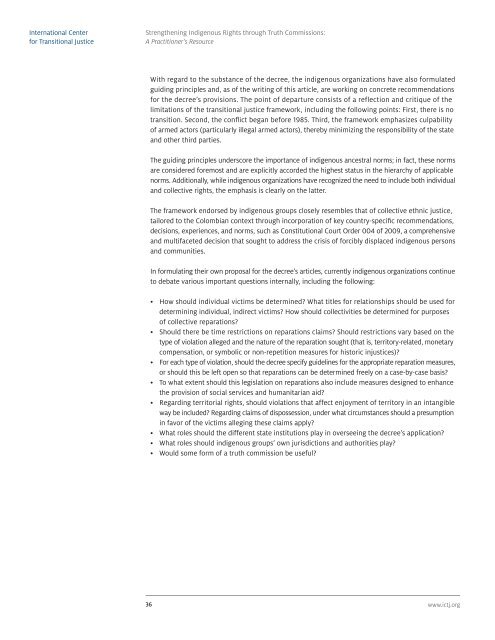International Centerfor Transitional Justice<strong>Strengthening</strong> <strong>Indigenous</strong> <strong>Rights</strong> <strong>through</strong> <strong>Truth</strong> <strong>Commissions</strong>:A Practitioner’s ResourceWith regard to the substance of the decree, the indigenous organizations have also formulatedguiding principles and, as of the writing of this article, are working on concrete recommendationsfor the decree’s provisions. The point of departure consists of a reflection and critique of thelimitations of the transitional justice framework, including the following points: First, there is notransition. Second, the conflict began before 1985. Third, the framework emphasizes culpabilityof armed actors (particularly illegal armed actors), thereby minimizing the responsibility of the stateand other third parties.The guiding principles underscore the importance of indigenous ancestral norms; in fact, these normsare considered foremost and are explicitly accorded the highest status in the hierarchy of applicablenorms. Additionally, while indigenous organizations have recognized the need to include both individualand collective rights, the emphasis is clearly on the latter.The framework endorsed by indigenous groups closely resembles that of collective ethnic justice,tailored to the Colombian context <strong>through</strong> incorporation of key country-specific recommendations,decisions, experiences, and norms, such as Constitutional Court Order 004 of 2009, a comprehensiveand multifaceted decision that sought to address the crisis of forcibly displaced indigenous personsand communities.In formulating their own proposal for the decree’s articles, currently indigenous organizations continueto debate various important questions internally, including the following:• How should individual victims be determined? What titles for relationships should be used fordetermining individual, indirect victims? How should collectivities be determined for purposesof collective reparations?• Should there be time restrictions on reparations claims? Should restrictions vary based on thetype of violation alleged and the nature of the reparation sought (that is, territory-related, monetarycompensation, or symbolic or non-repetition measures for historic injustices)?• For each type of violation, should the decree specify guidelines for the appropriate reparation measures,or should this be left open so that reparations can be determined freely on a case-by-case basis?• To what extent should this legislation on reparations also include measures designed to enhancethe provision of social services and humanitarian aid?• Regarding territorial rights, should violations that affect enjoyment of territory in an intangibleway be included? Regarding claims of dispossession, under what circumstances should a presumptionin favor of the victims alleging these claims apply?• What roles should the different state institutions play in overseeing the decree’s application?• What roles should indigenous groups’ own jurisdictions and authorities play?• Would some form of a truth commission be useful?36www.ictj.org
International Centerfor Transitional Justice<strong>Strengthening</strong> <strong>Indigenous</strong> <strong>Rights</strong> <strong>through</strong> <strong>Truth</strong> <strong>Commissions</strong>:A Practitioner’s Resource5. <strong>Indigenous</strong> Self-Determination and Political<strong>Rights</strong>: Practical Recommendations for <strong>Truth</strong><strong>Commissions</strong>Paige Arthur<strong>Truth</strong> commissions and commissions of inquiry are not new for indigenous peoples. In Guatemala, Peru,Australia, Chile, and Canada, indigenous peoples have been consulted, given statements, read reports, andmore. Yet the larger question for indigenous peoples must be: how can a truth commission advance theirlonger-term vision of self-determination and full exercise of their political rights? Can a truth commissioneven make a difference on these issues?In the past, truth commissions have not made much of a difference on these particular issues, it is true.Perhaps Guatemala’s Commission of Historical Clarification (CEH) is the only one that has made ademonstrable contribution to the participation of indigenous people in public life. The commission’s findingthat the state had committed acts of genocide against indigenous peoples helped to reframe political debatein Guatemala, and the struggle for truth and reparations galvanized a range of indigenous groups tobecome more active politically. 66 The story continues, more than 10 years after the government initiallyrejected the CEH’s report. In June 2011, a former general in the Guatemalan army was arrested—the firstperson to be arrested in Guatemala on charges of genocide.A truth commission cannot lead to self-determination by itself. But it may be part of a longer-term processleading in that direction. In order to contribute, however, they may need to operate a bit differently than inthe past. The goal of this paper is to identify some practical recommendations for a truth commission toconsider, to contribute to the realization of self-determination and other political rights for indigenous peoples.In international law, self-determination is defined as the right of all peoples to “freely determine their politicalstatus and freely pursue their economic, social, and cultural development.” While recognizing that there isa diversity of opinion within indigenous communities about what form self-determination should take,this paper will focus on claims that do not involve secession from a state. This choice is made due to twosimple facts. First, claims for secession are not the dominant ones among indigenous peoples today (althoughthey do exist). And, second, achieving secession, whether for indigenous groups or national minorities, hasproved extremely difficult, the recent case of Kosovo notwithstanding. Therefore, the paper will look ata group’s right to freely determine its own development in terms of pursuing that development as part ofan existing state.Political rights refer to the rights of all individuals to participate in decisions that affect their lives, andeffective participation will be the focus of this paper. This includes, among other things, voting, membershipof a political party, and standing for election. Effective participation is important for other political andcivil rights, as well as economic, social, and cultural rights.Finally, since other authors in this resource deal with cultural rights and land claims, this paper will avoid thosetopics. However, it must be noted that these issues are intertwined. Claims to self-determination are oftendeeply linked to land among indigenous peoples, as a special connection with a territory shapes the distinctiveidentity—as well as the livelihoods—of indigenous groups. Effective participation is often linked to protectingimportant cultural rights, as well as a community’s capacity to reproduce its culture across generations.66See Isaacs, At War with the Past.37www.ictj.org
















